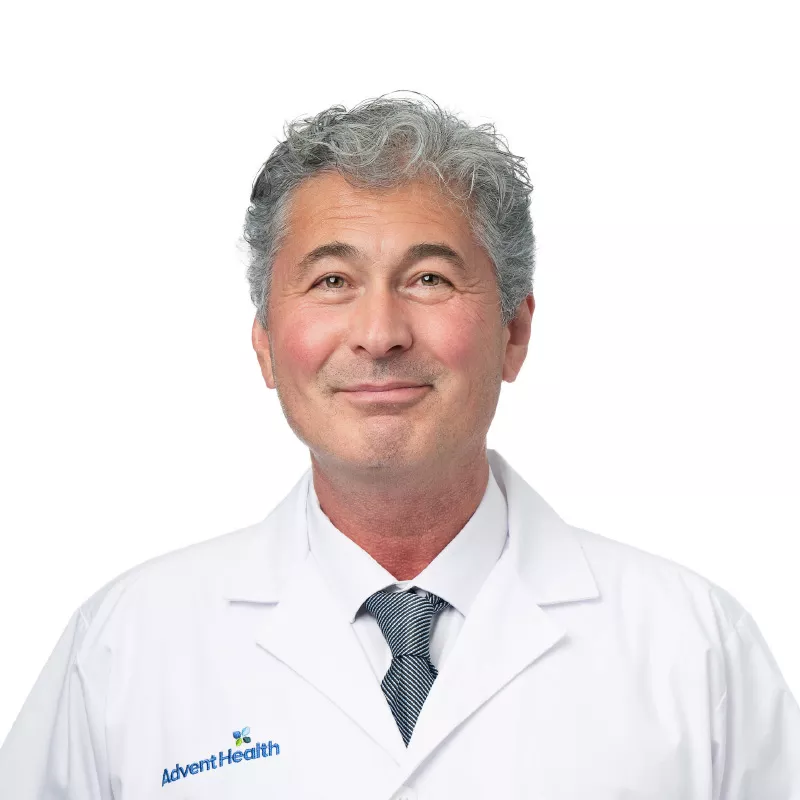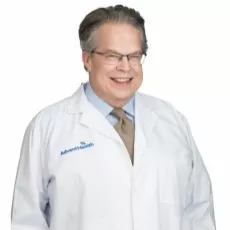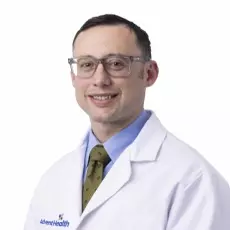
The Expertise You Need and the Care You Deserve
Your path to a liver transplant begins here, at our AdventHealth Transplant Institute. Our world-class liver care team is here to guide you every step of the way, offering personalized treatment plans and collaborative care.
Visit the Scientific Registry of Transplant Recipients to view our liver transplant program's latest statistics and data.
Your Liver Transplant Treatment Journey
You're ready to take charge of your health. Our liver transplant team is prepared to help guide you from navigating the application process to collecting your medical records.
We're working toward the same goal: a successful liver transplant that will help you live a longer, healthier, fuller life. Our evaluation process is designed to ensure a clear path to achieving that goal. We focus on the patient experience to optimize not only your health but also your time and convenience.
Our median transplant wait time is less than one-quarter of the national average, and our care team is dedicated to caring for you and your support system.
Find peace of mind with a liver transplant team that combines state-of-the-art technology and collaborative patient care.
We'll guide your recovery every step of the way, empowering you with the information, tools and resources you need to care for your new liver.
Meet Our Team of Experts
-

Bahri Bilir, MD
Transplant Hepatology
Transplant Hepatology
-

Thomas Collins, MD
Transplant Surgeon
Transplant Surgery
-

Thomas Heffron, MD
Transplant Surgery
-

Daniel Kuehler, MD
Transplant Surgery
-

Clark Kulig, MD, FAASLD
Transplant Hepatology
-

Hunter Moore, MD
Transplant Surgery
-

Mauricio Orrego, MD
Transplant Hepatology, Hepatology
-

Matthew Stotts, MD, MPH, MSc
Transplant Hepatology
Comprehensive Liver Treatments and Surgical Care
- Advanced Hepatology Program
-
The AdventHealth General and Transplant Hepatology Programs are housed within the Institute. Our expert hepatology care bridges the gap between general hepatology and liver patients needing transplants.
Living with liver, gallbladder, biliary tree and pancreas disease takes a toll on both patients and caregivers. But our program is passionate about creating an internationally recognized program that helps patients with liver disorders through treatment and research.
Our hepatologists care for hundreds of patients with liver, pancreatic, gallbladder and biliary tree disease. From education and treatment to leading-edge research, we give our patients hope and healing, all in a compassionate, patient-centered environment.
Our state-of-the-art facilities and expert specialists are equipped to care for all your hepatology needs, from the common to the complex, including:
- Abnormal liver tests
- Viral hepatitis A, B, C, D, E
- Autoimmune liver disease
- Autoimmune hepatitis
- Primary biliary cirrhosis
- Primary sclerosing cholangitis
- Overlap syndromes
- Drug-induced liver injury
- Liver tumors (malignant and benign)
- Ascites, esophageal and gastric varices and portal hypertension
- Hepatic encephalopathy (confusion induced by liver disease)
- Liver biopsies (ultrasound-guided and laparoscopic)
- Abdominal paracentesis
- Pre- and post-transplant services
- Hepatobiliary Surgery Program
-
Our hepatobiliary surgery program offers a full spectrum of medical and surgical expertise for hepatobiliary disorders. The providers in this multidisciplinary program work with other experts in related fields to provide comprehensive care for patients with benign and malignant problems of the liver, bile duct, duodenum and pancreas.
This group holds a weekly tumor board to determine specific recommendations and treatment plans for each patient. This type of care is now the standard both in transplant and cancer care.
We specialize in hepatobiliary surgical procedures, including:
- Laparoscopic liver biopsy
- Open or minimally invasive radiofrequency ablation
- Open or minimally invasive liver resection
- Bile duct resection
- Pancreas resection, including the Whipple procedure
- General surgery for patients with cirrhosis
- Liver transplantation
Our specialists treat and assess the following conditions:
Benign liver lesions
- Cysts (simple, cystadenoma, or infectious)
- Hemangiomas
- Adenomas
- Focal nodular hyperplasia
- Polycystic liver disease
- Liver abscess
Benign bile duct diseases
- Bile duct injury
- Bile duct stricture
- Complex bile duct stone disease
- Choledochal cyst
Benign pancreas lesions
- Intraductal papillary mucinous neoplasm
- Pseudocyst
- Ductal stones or stricture
- Pancreatic cystic neoplasms
Malignant tumors of the liver, bile duct, pancreas or duodenum
- Hepatocellular carcinoma
- Cholangiocarcinoma
- Cystadenocarcinoma
- Ampullary carcinoma
- Pancreatic adenocarcinoma
- Neuroendocrine tumors
- Tumors metastatic to the liver
Understanding Your Comprehensive Treatment Plan
Liver transplantation is the best treatment option for many patients with chronic liver disease, failure or certain types of cancer. Liver transplants have promising outcomes, and transplant recipients often return to the activities they enjoyed before they became sick.
At our AdventHealth Transplant Institute, you can rest easy knowing our nationally recognized program and leading experts will be with you at every step.
- Your Transplant Team
-
Our comprehensive liver program focuses on providing exceptional care and a personalized patient experience. Our transplant experts include a diverse group of physicians and team members who believe in a multidisciplinary approach to complex medical problems. We provide our liver patients with the knowledge, support and compassion necessary to guide them through each stage of their treatment.
The first step in your transplant journey is getting to know each specialist on your transplant team.
You’ll have one-on-one meetings with each member during the evaluation process, but your dedicated health team stays closely connected throughout your entire transplant journey.
Your social worker supports your journey and makes sure you're mentally and emotionally ready to undergo a liver transplant. Their line of questioning will make sure you and your caregivers are prepared to take care of your transplant by following the medical team's recommendations.
If they feel you need additional resources, such as housing or financial assistance, they'll help connect you to the right ones in your community.
Your registered dietitian focuses on keeping you as healthy as possible before, during and after surgery. Nutrition plays a critical role, so it's essential that you follow your meal plan every day. They'll help you stay mindful about what you put into your body leading up to liver transplant surgery and help you understand how certain medications may affect your appetite or interact with certain foods and substances.
After surgery, your dietitian will create a detailed eating guide to keep your transplanted organ working like new.
Your transplant hepatologist will review your test results and medical history in detail, addressing any unanswered questions or concerns. If more tests are necessary, they'll guide you through what happens next. They’ll also care for your medical needs as you recover from surgery.
Your transplant surgeon and nurse practitioner work as a team toward your successful liver transplant and long-term health. During your initial meeting with them, they'll walk you through what to expect before, during and after surgery.
The one-on-one meetings during your evaluation are meant to be candid conversations with a team as invested in your health as you are. Bring the questions you’ve been worried about, bring your support person and know that we’re here for you.
- The Evaluation Process
-
Our liver transplant evaluation process is designed to ensure your transplant is successful and that you have all the resources you need to care for your new liver for life.
The evaluation is an opportunity to get to know your transplant care team while undergoing a series of medical tests. Just as important, it's an opportunity for you to share your questions and concerns, introduce us to your caregiver, and talk about what to expect before, during and after your liver transplant.
Liver transplants are reserved for critically ill patients. Our team of hepatology experts will work hard to understand the cause of your liver problem and make sure there’s no other course of treatment before recommending a transplant.
There are numerous reasons you may clinically need a liver transplant to extend your life and improve your quality of life, including:
- End stage cirrhosis
- Acute or chronic hepatitis from a virus or autoimmune disease
- Chronic autoimmune attack of the bile ducts from primary sclerosing cholangitis or primary biliary cholangitis
- Acute liver failure without a history of liver disease
- Liver cancer (hepatocellular carcinoma)
- Iron overload affecting the liver
- Alpha-1 anti-trypsin (A1AT) deficiencies affecting the liver
- Metabolic disorders
Lab and Diagnostic Testing
To make sure your body is ready to undergo a successful liver transplant procedure, we perform lab and diagnostic testing on every patient.
Our team will guide patients and caregivers through the following tests in our Denver facility, including:
- Complete blood workup
- Ultrasound exam of the liver and other abdominal organs and blood vessels
- Computed tomography (CT) scan or magnetic resonance imaging (MRI) of the abdomen
- Cardiac stress test
- Echocardiogram (a heart exam done by ultrasound)
- Electrocardiogram (measures your heart's electrical activity)
- Endoscopy (a small tube with a tiny video camera examines internal organs)
- Standard cancer screenings
Patient Review Committee
Once you've met with every person on your team and your tests have been processed, your transplant coordinator will present your case to the Patient Review Committee. They'll review it to determine your best course of treatment. If your team is confident a transplant is the best option, your name will be placed on the national waiting list.
Multiple Listings
If you’re being evaluated by another transplant center, let us know so we can avoid duplicate testing and move you along faster. Please keep in mind that every center evaluates and accepts patients based on their own criteria, and being listed in one place doesn't guarantee acceptance to every center.
Our commitment to comprehensive hepatology care means our whole-patient care goes beyond transplants. Once you're referred to our liver transplant program, our world-renowned specialists will work to determine which treatment will work for you, even if a transplant isn't an option.
- We’ll Be Waiting With You
-
We know the question that keeps you up at night: "How long will I wait?" We can't answer that question with certainty. But we can tell you that our team will work to match you with an appropriate donor organ as quickly as possible.
Your transplant coordinator will keep you informed from the moment your name is put on the list to the second we find the right liver for you. And during the moments in between, we're here to answer your questions and support you with a listening ear.
The United Network for Organ Sharing (UNOS) manages the national waiting list for organ transplants. If you meet the criteria, your transplant coordinator will add you to the liver transplant list. Your information — including your blood type, medical urgency and our location — is entered into the UNOS computerized network.
Your place on the list depends on your MELD score (Model for End-Stage Liver). The more urgent your needs, the higher you'll be placed on the list. Your MELD score will be periodically reevaluated to keep the waiting list as accurate as possible. When an organ procurement organization confirms that a deceased donor liver is available, the donor's information is entered into the same system. Using the combination of your information and the donor's, the UNOS computer system generates a "match run," a rank-order list of candidates.
Liver Transplant Pre-Education Class
We've seen firsthand that patient education is key to a successful liver transplant. The more you and your support system know about how to care for yourself before, during and after your transplant, the more likely you are to follow your team’s medical recommendations throughout the process.
You’ll have multiple education sessions before and after your transplant to help you understand what is needed and what to look for to make sure your liver functions properly for as long as possible.
We encourage you, your caregivers and members of your support system to ask questions.
What Can You Do While You Wait?
While you’re waiting, resolve to focus on the things you can control: your day-to-day health and habits. And during the moments in between, when you're waiting for the phone to ring, we're here to answer questions and provide a listening ear. Focusing on your whole health helps ensure that when the right liver becomes available, your mind and body are ready to receive it. Prioritize balanced nutrition. Get in steps wherever you can. Keep up with routine health screenings, from dental visits to eye exams. And whenever it’s needed, take a break.
Be sure to let us know if you have any address, name or insurance changes and let your transplant coordinator know of any illness, surgery or hospitalization.
You can also prepare for when you do receive the call. You’ll likely need to get to our AdventHealth Transplant Institute in Denver within a few hours. Have a designated driver, established transportation and a travel bag packed.
Getting the Call
Your transplant care coordinator will be the first to call the moment we think we have the right liver for you. Most patients say it's a moment they'll never forget. Let it sink in. Then, arrange to come to our transplant center for final evaluation and pre-op. We’ll be ready.
- What to Expect on Surgery Day
-
Your care team will walk you through the entire transplant procedure from start to finish and answer any questions you may have.
As with any surgery, there are risks, including:
- Organ failure: your new liver may fail to function properly
- Bile duct complications (leakage, shrinkage or blockage)
- Hepatic artery thrombosis (blockage of artery going to liver)
- Recurrence of hepatitis
- Tissue rejection
We'll give you immunosuppressive medications to help your body accept its new liver. These medications may cause upset stomachs, facial hair, acne or weight gain. They may also increase your chances of developing some types of cancer. Other side effects may include bone thinning, diabetes, skin sensitivity, puffiness, swollen gums, high blood pressure and increased cholesterol.
We've made incredible strides over the last few decades, and while the possibility of risks will always exist, liver transplantation has never been a safer, more effective long-term solution.
During Surgery
While you're getting your healthy new liver, you'll be surrounded by a team of world-renowned liver transplant surgeons and specialists who have collectively performed hundreds of liver transplants. They’ll monitor every detail, from your heart rate and blood pressure to your blood oxygen level. To help you breathe, your transplant team will insert a breathing tube into your windpipe.
The details of your surgery may vary depending on your specific condition, but most liver transplants take approximately two to four hours and are done under general anesthesia.
After Surgery
This is where the road to recovery and a healthy new life begins. No patient's plan is the same, and how long you stay in the hospital depends on a variety of factors, but most patients stay anywhere between one to three weeks after a liver transplant.
You'll likely spend the first 24 to 48 hours in the intensive care unit before you're transferred to the transplant unit for the rest of your hospital stay. More than likely, your team will recommend that you and your caregivers keep visitors to a minimum to reduce the risk of infection.
You'll start feeling like yourself sooner than you think. Your appetite will come back, and your energy levels will rise. We'll monitor you closely through daily exams, regular blood work and various radiologic tests to make sure your liver is working as expected and that no infections are present. Your nurse will guide you through exercises and therapies designed to keep your lungs clear and get you back on your feet.
- Life After a Liver Transplant
-
Your journey with us doesn't end with surgery. We'll guide your recovery every step of the way, empowering you with the information, tools and resources you need to care for your new liver throughout the rest of your life.
Outpatient Institute Visits
Once you're cleared to leave the hospital, your team will continue to help ease your transition to independent living. You'll leave our AdventHealth Porter hospital armed with detailed instructions, a supply of meds and a list of numbers to contact for any questions or emergencies.
We'll stay in close, regular contact via your nurse coordinator. Since we’ll need to see you frequently, we can help arrange local housing.
Between lab work and one-on-one check-ins with your transplant team, each visit will last about four hours. After one month, we'll reduce your visits to two times per week and eventually to once a week. At the end of the three-month period, we'll refer you back to your hepatologist for routine care, and we'll see you back at our AdventHealth Transplant Institute every year for your annual visit.
A Healthy Lifestyle
Treating your new liver with care means treating your body well. Eat smart. Exercise with heart. And never forget the physical, emotional and mental challenges you’ve overcome. Your transplant team will create a detailed health and maintenance plan, including diet and exercise recommendations and tips on avoiding infection.
Medications
Anti-rejection medications help prevent liver transplant rejection and will be part of your daily routine from this day forward. Without them, your body may begin to reject your new liver. Your transplant team will give you detailed instructions on how and when to take your medications.
Ongoing Education
Throughout the year, our transplant education team hosts individual sessions on various topics such as nutrition, keeping your new organ functioning properly and caregiving. All patients and members of their support system are welcome to attend as part of their organ transplantation journey.
Transplant Support Groups
Sharing your experience with other liver and organ transplantation patients can be an essential part of the recovery and maintenance process for many patients. We’ll connect you to local and national resources online and in your community.
Staying Connected
We're part of your story, and you're part of ours. In addition to your annual visits, we keep our team-patient connections strong through yearly events like Donor Dash.
A Network of Liver Care for Whole Health
You’re a connected system: body, mind and spirit. And so are we. At our AdventHealth Transplant Institute, we're committed to a multidisciplinary approach to care, giving you the support you need to thrive. You can count on us to listen to you, respect your time, compare notes and make liver transplant care decisions that meet your unique circumstances.

